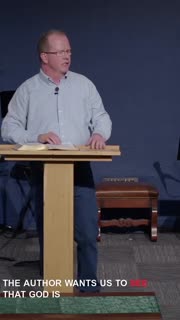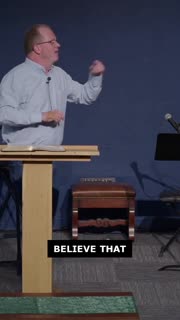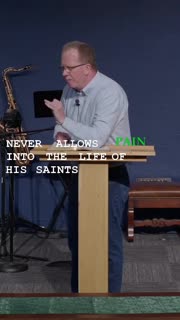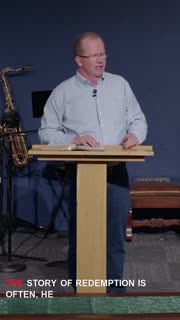Trusting God Through Pain: Lessons from Naomi and Ruth
Devotional
Sermon Summary
Bible Study Guide
Sermon Clips
1. "Maybe you've been, in places, and maybe you've experienced some things. Maybe you've had a long-term health issue that you wonder, why isn't God healing that? Maybe you've had a loss of a loved one recently, and did she deserve that? She was so good to you. Maybe there's all kinds of questions. Is God good? I mean, is He fair? Is He just? There's so many happenings that are maybe going on in your life right now that it just doesn't seem as if God is close or near that He cares. Why should you trust Him? Why should you trust God when life hurts?" [02:46] (34 seconds)
2. "The author wants us to see that God is in control. That God is the writer of the story, her story and your story and my story. You can imagine, just as things happened and transpired, you can imagine her questioning her God. She is a covenant member of Israel. I thought you were a good God. I thought you were loving God. The covenant love that you promised Israel, where is it? You can imagine some of her midnight talks with God and the tears flowing down her face. Why God? Why God? Why God? Why did you let that happen?" [16:27] (47 seconds)
3. "God is in charge of all things. God is the sovereign one of all things. God is in control of all things. All the events that come into your life, they don't come randomly, they don't come by accident, they don't come by chance. There isn't this group of powers out there, the fates, the chances, the contingencies that are bouncing against each other that are somehow bringing stuff into your life. Everything comes from God. We live and move and have our being and Him." [21:29] (30 seconds)
4. "Will you believe that God has a purpose that you can't see yet? Will you believe that God has a reason for allowing trouble in your life? Will you trust Him with that? Will you believe that God is not doing anything happenstance or by accident? Will you believe that God is a sovereign God who has a plan and purpose even for allowing trouble in your life because He's going to bring us some good at the end?" [41:13] (23 seconds)
5. "We think that if He allowed Jeron to get sick and almost die that God must have been sleeping or He wasn't paying attention or He didn't love Jeron. No. He has His purposes. And I think Ruth was able to survive the crisis of losing her family and she understood God's power and authority, but she believed in some fashion, in some way that God was up to something. That God was allowing these things to happen or even choosing to make these things happen because He wanted to bring about some good end. Will you trust God with the good end?" [43:00] (34 seconds)
6. "God never allows pain into the life of His saints without a purpose. He never allows suffering, He never allows hardship, He never allows evil into the life of His saints without some purpose. The great God, the good God, is doing something even in your suffering that will bring good in the end. Trust Him even in the dark, even when you're suffering, even in the pain, that He knows what He's doing and He loves you and He's going to be with you through it all. Believe in Him. Trust in Him even in the hard times." [48:09] (42 seconds)
7. "We have this contract with God in our mind. Hey, if I show up to church once in a while and listen to Jeron's long sermon, you've got to bless me, right? I'm a good person. I didn't steal from anybody this week. You've got to bless me. We have these kind of deals with God like if I'm a good person, I didn't cheat or do anything wrong, He's going to bless me. That's not how God works. That's a works-based relationship. God always gives with grace. We don't deserve anything from Him in salvation and in our life." [41:51] (28 seconds)
8. "The story of redemption is often, He brings about salvation and rescue and deliverance. Maybe He's allowing you to go through what you're going through because it's going to bring about something great in the kingdom of God. Do you see anything here that might support this thesis or this idea? I do. The book of Exodus talks about Israel being a witness to the nations. They're going to be ambassadors to the nations. They're going to be God's missionary people to the nations." [43:33] (36 seconds)
9. "You start thinking about the tapestry of God's will and all the things He's got going on, the infinite God with infinite power, always working on all these lives. It's hard to put together, but for this one woman, because God allowed things to happen in Moab through the family of Elimelech, she came to faith in the Lord God Almighty. She became a worshiper. God is always up to something. He used their brokenness, their shame, their weeping, and their hardship to bring the truth of who God is and what He's like to invite a woman to become a worshiper." [46:52] (45 seconds)
10. "She has a decision to make. She has something to work on here. She is going to either trust God or she's going to walk away from God. But she's got this thing in her mind like, notice again, she's angry. She's bitter. How long did she carry that? Maybe, I've known people that have walked away from this church because God didn't let their mom live. I've known people that have walked away from fellowshipping with this church because their kid got sick or they lost a job. God can't be good. God can't be great if He didn't provide for my needs." [40:02] (33 seconds)
Ask a question about this sermon
2. "The author wants us to see that God is in control. That God is the writer of the story, her story and your story and my story. You can imagine, just as things happened and transpired, you can imagine her questioning her God. She is a covenant member of Israel. I thought you were a good God. I thought you were loving God. The covenant love that you promised Israel, where is it? You can imagine some of her midnight talks with God and the tears flowing down her face. Why God? Why God? Why God? Why did you let that happen?" [16:27] (47 seconds)
3. "God is in charge of all things. God is the sovereign one of all things. God is in control of all things. All the events that come into your life, they don't come randomly, they don't come by accident, they don't come by chance. There isn't this group of powers out there, the fates, the chances, the contingencies that are bouncing against each other that are somehow bringing stuff into your life. Everything comes from God. We live and move and have our being and Him." [21:29] (30 seconds)
4. "Will you believe that God has a purpose that you can't see yet? Will you believe that God has a reason for allowing trouble in your life? Will you trust Him with that? Will you believe that God is not doing anything happenstance or by accident? Will you believe that God is a sovereign God who has a plan and purpose even for allowing trouble in your life because He's going to bring us some good at the end?" [41:13] (23 seconds)
5. "We think that if He allowed Jeron to get sick and almost die that God must have been sleeping or He wasn't paying attention or He didn't love Jeron. No. He has His purposes. And I think Ruth was able to survive the crisis of losing her family and she understood God's power and authority, but she believed in some fashion, in some way that God was up to something. That God was allowing these things to happen or even choosing to make these things happen because He wanted to bring about some good end. Will you trust God with the good end?" [43:00] (34 seconds)
6. "God never allows pain into the life of His saints without a purpose. He never allows suffering, He never allows hardship, He never allows evil into the life of His saints without some purpose. The great God, the good God, is doing something even in your suffering that will bring good in the end. Trust Him even in the dark, even when you're suffering, even in the pain, that He knows what He's doing and He loves you and He's going to be with you through it all. Believe in Him. Trust in Him even in the hard times." [48:09] (42 seconds)
7. "We have this contract with God in our mind. Hey, if I show up to church once in a while and listen to Jeron's long sermon, you've got to bless me, right? I'm a good person. I didn't steal from anybody this week. You've got to bless me. We have these kind of deals with God like if I'm a good person, I didn't cheat or do anything wrong, He's going to bless me. That's not how God works. That's a works-based relationship. God always gives with grace. We don't deserve anything from Him in salvation and in our life." [41:51] (28 seconds)
8. "The story of redemption is often, He brings about salvation and rescue and deliverance. Maybe He's allowing you to go through what you're going through because it's going to bring about something great in the kingdom of God. Do you see anything here that might support this thesis or this idea? I do. The book of Exodus talks about Israel being a witness to the nations. They're going to be ambassadors to the nations. They're going to be God's missionary people to the nations." [43:33] (36 seconds)
9. "You start thinking about the tapestry of God's will and all the things He's got going on, the infinite God with infinite power, always working on all these lives. It's hard to put together, but for this one woman, because God allowed things to happen in Moab through the family of Elimelech, she came to faith in the Lord God Almighty. She became a worshiper. God is always up to something. He used their brokenness, their shame, their weeping, and their hardship to bring the truth of who God is and what He's like to invite a woman to become a worshiper." [46:52] (45 seconds)
10. "She has a decision to make. She has something to work on here. She is going to either trust God or she's going to walk away from God. But she's got this thing in her mind like, notice again, she's angry. She's bitter. How long did she carry that? Maybe, I've known people that have walked away from this church because God didn't let their mom live. I've known people that have walked away from fellowshipping with this church because their kid got sick or they lost a job. God can't be good. God can't be great if He didn't provide for my needs." [40:02] (33 seconds)










